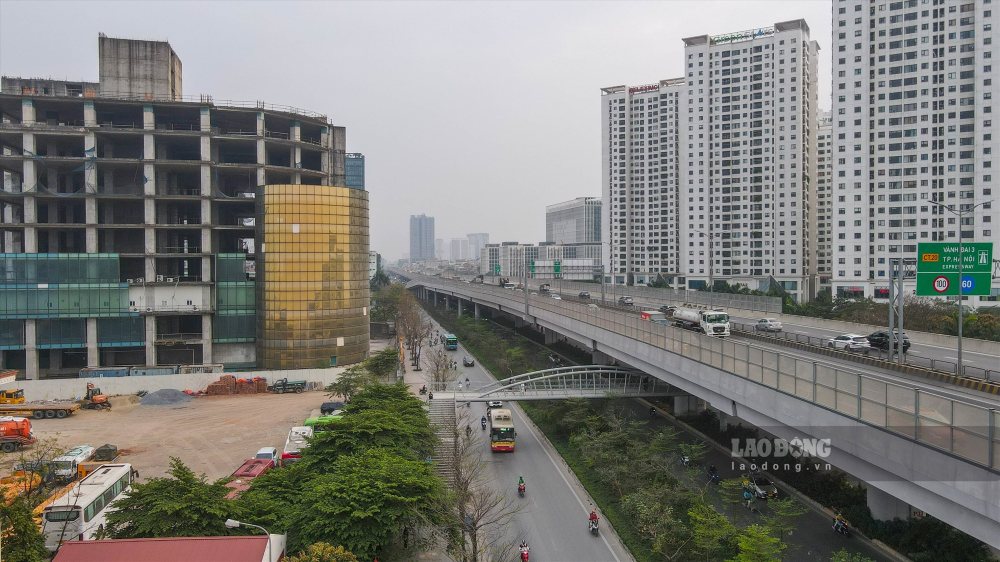In an interview with Lao Dong Newspaper, Lawyer Nguyen Thanh Ha - Chairman of SBLAW Law Firm - said that the regulation in the draft amendment to Decree 103/2024/ND-CP on collecting land use fees and land rents with interest rates up to 5.4%/year, including projects that occurred before the effective date of the 2024 Land Law, is contrary to legal principles.
Lawyer Nguyen Thanh Ha acknowledged that this regulation not only causes injustice to businesses but also has many serious economic and legal consequences.
How do you evaluate the legality of the regulation requiring people and businesses to pay additional land use fees for the waiting period for determining land prices stated in Decree 103/2024/ND-CP and is still kept unchanged in the draft amendment being announced by the Ministry of Finance for comments?
- The provisions in the draft clearly go against the principle of law application stipulated in Article 156, Law on Promulgation of Legal Documents.
The law clearly stipulates: The legal document is applied to acts occurring at the time the document is in effect. In case the provisions of the document come into effect before, they can only be applied if the new provisions are more beneficial to the affected person". Meanwhile, the regulation requires the collection of land use fees at an interest rate of 5.4%/year for projects occurring before August 1, 2024 - the time the 2024 Land Law takes effect.
This is a violation of legal principles. When applying new laws to handle past behavior in an unfavorable manner for people and businesses, it is not only against the law but also easily creates the risk of legal disputes.
So what is the nature of the above regulation, Lawyer?
- In essence, there is a gap in time from when individuals and businesses have a decision to allocate land, lease land to when determining land prices. However, determining land prices quickly or slowly belongs to State agencies, people or businesses that do not have the right to intervene. Therefore, forcing businesses to pay additional money while waiting is unfair.
In fact, many projects have had to be "shelved" because they do not have land prices, are not granted red books, and are not put into use. They do not generate any revenue from that land but are still being collected, which is unreasonable. This is a paradox: people who do the right thing and wait for the right thing will be " given a "reverse fine". Meanwhile, the delay comes from the state management agency.
However, some opinions say that this regulation is necessary to prevent businesses from taking profits. How do you consider this issue?
- There may be cases where businesses put into business early when the land price has not been determined. However, it is impossible to take the mistakes of a few to put everyone together. Policy development needs to ensure classification and fairness. If for a few businesses, even the right ones are harvested, it would be no different from "squattered". The policy goal is to put the interests of the majority of people and businesses that comply with the law first.

In your opinion, what economic consequences could this regulation cause, especially for the real estate market?
- The consequences are very obvious. The first is to increase the financial burden on businesses. When large sums of money are collected with high interest rates, many businesses will fall into a passive position in terms of capital, forced to stop implementation or reduce the scale of the project. The supply to the market is already limited, and will be further affected.
Second is the impact on real estate prices. Increased input costs make it impossible to reduce product prices, while people still have difficulty accessing housing. This creates a domino effect: scarce supply, increased prices, frozen markets, and people's dream of settling down is increasingly distant.
In the long term, are you concerned that the market will face any other Domino effects?
- One of the decisive factors for the investment environment is the stability and predictability of the law. If businesses cannot predict costs, or can at any time be held back for unfounded obligations, they will be hesitant to invest in the long term.
In addition, the disadvantageous hoi back policy will directly affect investor confidence. This goes against the reformist spirit of Resolution 68-NQ/TW on private economic development as well as the policy of removing difficulties for the real estate market that the Government has repeatedly emphasized.
So, in your opinion, what is a reasonable solution to ensure harmony of interests and avoid negative impacts on the market?
- First of all, I think that salmon should not be applied to cases arising before August 1, 2024 - the time when the 2024 Land Law takes effect. If tried to apply, it would violate legal principles.
In addition, the collection - if really necessary - should only be applied to projects with delayed land price determination after August 1, 2024, after deducting 180 days is the valuation period according to the 2024 Land Law.
In the context of many market difficulties, adjusting policies in a fair and reasonable direction is something that needs to be done immediately, to avoid creating more barriers to economic recovery and maintaining trust in the law.
Thank you for sharing!












